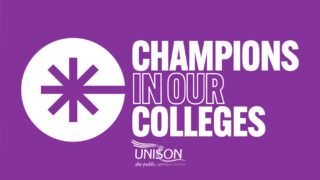Since the start of the first lockdown, schools, colleges and universities have had to rapidly shift to delivering online learning. Whilst the headlines were dominated by undergraduates unhappy at paying tuition fees for online degrees, or stressed parents trying to juggle home-schooling with work, college learners were overlooked.
Colleges serve a diverse range of learners – adults completing work-based training, apprentices on day release, full-timers completing vocational and academic programmes, people with severe learning difficulties learning life-skills – if it needs to be learned, then a college somewhere is probably delivering it.
Whilst colleges remained open to vulnerable learners throughout the lockdown, many more millions of learners had to study at home, online.
As colleges are considering moving towards a permanent blended learning model, with very little research or evidence on what the impact on learners will be, UNISON commissioned research into the social impact on learners of online learning.
The findings suggest that the majority of learners felt that being in college was more beneficial to them. Not only for practical reasons (such as access to resources and equipment), but also because a number of learners said their mental health had suffered whilst working at home. 56% stated that they benefited from the social environment at college.
In the very poorest areas of the UK, caring responsibilities were the biggest barrier to online participation. Common downsides to online learning were a struggle to concentrate at home, as well as ineffective online teaching.
Although many learners said they had benefited from saving time and money on travel, UNISON believes that leaving learners at home is not the solution to this problem. Restoring the Educational Maintenance Allowance is.
UNISON national officer Leigh Powell said: “We need to take note of what is happening in colleges since any negative impacts will be disproportionately felt by women, by Black learners, by those with disabilities and by those who live in economically-deprived areas since college populations represent a higher proportion of learners with these characteristics than those in other sectors of education.
“UNISON represents thousands of support staff in colleges who care deeply about the learners they serve. Colleges have already been subjected to the harshest cuts in the entire education sector in the past decade, and we must ensure that they are not harmed further by colleges blindly following a blended learning model that may save a few pounds on space but not benefit the learners or the staff.”




